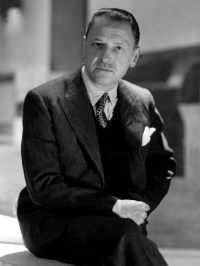It is very difficult to know people and I don't think one can ever really know any but one's own countrymen. For men and women are not only themselves; they are also the region in which they were born, the city apartment or the farm in which they learnt to walk, the games they played as children, the old wives' tales they overheard, the food they ate, the schools they attended, the sports they followed, the poets they read, and the God they believed in. It is all these things that have made them what they are and these are things that you can't come to know by hearsay, you can only know them if you have lived them,. You can only know them if you are them.
William Somerset Maugham was born in Paris in 1874. He spoke French even before he spoke a word of English, a fact to which some critics attribute the purity of his style.
His parents died early and, after an unhappy boyhood, which he recorded poignantly in 'Of Human Bondage' , Maugham became a qualified physician. But writing was his true vocation. For ten years before his first success, he almost literally starved while pouring out novels and plays.
During World War I, Maugham worked for the British Secret Service . He travelled all over the world, and made many visits to America. After World War II, Maugham made his home in south of France and continued to move between England and Nice till his death in 1965.
In China, my initial cultural shock is diminished by the Western style of dress adopted by nearly everyone, in particular, the young. […] And yet, once I get to know them, their "Chineseness" comes through. It comes through as certain values, for example, respect for the old and an appreciation of quietude, that have survived both the fanaticism of the Cultural Revolution and the present headlong drive for wealth. These values, like material goods, are public in the sense that one can see them in gestures and behavior. Beyond them – or perhaps I should say, underlying them – is patriotism and civilizational pride, a feeling or mode of being that rarely rises to surface consciousness and is the opposite of flag-waving. Its ultimate source is history, geography, and language.
But what do I mean by history, geography, and language? These areas of knowledge have both a public and a private aspect, and it is important that we know this to be the case. They are public in the sense that they are school subjects that can be formally taught. When a people is unsure of its identity, one solution is to teach it its history and geography, and make sure that its language continues to be used. A collective sense of self may well become firmer this way, just as it does when ethnic dress, food, and dance are adopted or reintroduced. However, besides such formally imparted knowledge, history, geography, and language can also mean something deeper, taught but not in any standard or prescribed way.
History is, then, stories and hearsay that one learns in passing in childhood and through eavesdropping on the conversation of adults; and it is routine participation in the historically grounded practices and rites of the tribe, not the mere putting on of a show, or the self-conscious mining and miming of the past to affirm one’s identity.
Geography is an intimate bond with place, knowing it at the most basic level through one’s senses and movements, knowing it practically in the course of carrying out the daily necessities of life, and knowing it emotionally through the use of charged words and deferential gestures.
Language can establish or sever a relationship, and in this capacity it complements facial expression and other bodily stances. But it is also the conceptualization and imaging of a world, an activity that is unique to the human species.
Understood in both their public and private aspects, the triune of history, geography, and language undergirds a people’s strongest sense of self. It also undergirds an individual member’s sense of self insofar as that individual is integrated into the group.
Yi-Fu Tuan (Traditional Chinese: 段義孚, born 5 December 1930) is a Chinese-U.S. geographer.
Tuan was born in 1930 in Tientsin, China. He was the son of a rich oligarch and was part of the top class in the Republic of China. Tuan attended University College, London, but graduated from the University of Oxford with a B.A. and M.A. in 1951 and 1955 respectively. From there he went to California to continue his geographic education. He received his Ph.D. in 1957 from the University of California, Berkeley.

